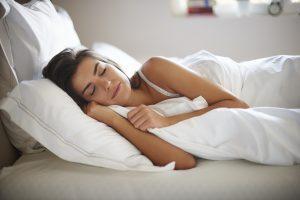Sleep is like a cat, it only comes to you if you ignore it, says Gillian Flynn in Gone Girl. In reality, one can’t ignore the stats that 55% of Indian adults face trouble sleeping at least three nights a week. We all would love to dive into a good sleep right away leaving all the tossing and turning to hopeless romantic hearts. But remember, sleep as a physiological process is very much like landing a plane. It takes time for your brain to descend gradually onto the firm bedrock of good sleep.
Many of us already have a few tricks up our sleeves to sleep like a baby. The most popular are, maintaining consistent sleep timings, avoiding caffeine, drinking chamomile tea, disengaging from screens and devices, diffusing essential oils, and whatnot. The good news is there are a few more scientifically grounded tips for better sleep that you can practice every day to improve your sleep routine. Sleep scientist Matt Walker explains how your room temperature, lighting, and other easy-to-fix factors can set the stage for a better night’s rest. So let’s get started right away!

- Room Temperature – Your brain and body need to drop their core temperature by about one-degree celsius in order to initiate sleep and stay asleep. The recommended bedroom temperature is around 18 degrees celsius, and well, we knowthat most Indian cities could get super hot during the summers and that maintaining such temperatures may not always be feasible especially if you don’t have an AC. Think of homegrown cooling agents such as Khus that can be part of your temperature control agent.
- Keeping the room dark – Darkness stimulates the release of a hormone called Melatonin that helps regulate the healthy timing of our sleep. For an under-stimulated environment, warm lights are the best way to dim down. People who are light-sensitive can try blackout shades or eye masks to block out light.
- Walk it out – Contrary to the popular belief that you wrestle your way out and the sleep will eventually cave in, sleep scientists believe that it is not a great idea to stay in bed for more than 25 minutes if you are unable to get back to sleep or trying to fall asleep. It is recommended you get out of bed and go do something else such as pacing and walking in the room, reading a book, or listening to a song and return to bed only when you are sleepy again.
- Wind-down routine – A nice wind-down routine could include a light dinner minimum of two hours before your bedtime and a nice bath before sleep. If not a full bath, you can wet your feet, setting an optimal temperature and blood circulation for your body.
- Sleep exercises – Research studies have established a link between meditative movements and improved sleep quality. Our top three favorite stretches are a bear hug, child pose, and neck stretches. You can also try the Shiatsu acupressure massage points or the 4- 7- 8 technique in which you breathe through the nose for 4 seconds, hold your breath for seven seconds, and breathe out through your mouth counting to eight, repeating this set four times. You can also try the 60 seconds eye blinking technique, in which you blink your eyes for a minute straight and due to this rapid eye movement your eyes get tired, inviting your beloved sleep.






